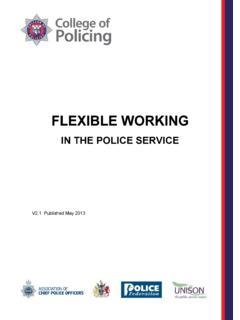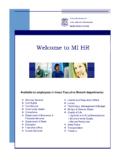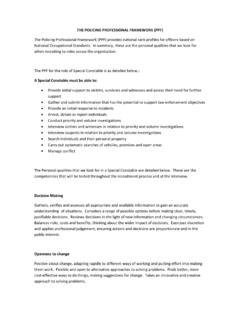Transcription of Disability in the Police Service - North Yorkshire …
1 Recruitment Recruitment Table of contents Recruitment policy 2. Reasonable adjustments 3. Clarification of Disability 6. Resolving disputes 6. Recruitment procedure 8. Job requirements 8. Advertising vacancies 9. The application form 10. The assessment stage 10. The medical assessment 11. Mental health and fitness for the job 13. Health and safety 14. Making a decision 15. Transferees 16. Good practice and positive action 16. Appendix A: Procedure for the assessment of candidates with a Specific Learning Difficulty 18. 1. Recruitment policy 1. The Disability Discrimination Act (DDA) provisions cover all aspects of the recruitment process, including role profiles, advertising vacancies, assessment, selection and induction.
2 2. Direct discrimination is unlawful but restriction or exclusion in certain circumstances may be justified. However, before any decision to restrict or exclude is made all possible reasonable adjustments need to have been explored. It is unlawful to restrict or exclude from employment an applicant with a Disability : it would be unlawful for a force to refuse to recruit someone because the individual had diabetes, if the force had not carried out a proper assessment of the candidate's skills and abilities and/or did not consider making a reasonable adjustment. Each application must be viewed on its own merit and assessed to establish whether the applicant is fit for the job.
3 This assessment should take into consideration the current position and also aim to evaluate the likelihood of the individual being able to provide ongoing Service for a reasonable time to come, as determined by the Police Pensions Regulations 2006. 3. The legislation obviously does not mean that people who are unfit to perform the duties of the job should be recruited; there is no expectation on a force to recruit an individual who is unable to fulfil a substantial part of a role. However, the legislation does allow the Police Service to recruit able individuals who would previously have been excluded on medical or other grounds. It may be permissible on occasion to reallocate part of the job to others as part of the reasonable adjustment.
4 4. Suitable applicants must not be rejected on the grounds that they have a progressive medical condition which could predispose them to early retirement through ill-health, or because they have had treatment for a condition which could recur and which could lead to restricted duties and/or early retirement through ill-health. 5. Applications from disabled people should be assessed in terms of the individual's ability to carry out the role, functions and activities of an operational constable as detailed in the Police Integrated Competency 2. Recruitment Framework, and in terms of the candidate's fitness for work assessed using the National Medical Standards for Recruitment framework.
5 6. This framework provides a common approach, for consistent decision making. The nature and extent of a candidate's Disability will determine what adjustments (if any) are required, taking into account the costs involved and the likely effectiveness of the measures. An assessment of the likelihood of an individual's early retirement through ill-health will inform the force's decision on their eligibility for the Police Pension Scheme. 7. The decision to recruit is a management decision, with input from other professions from others including the recruitment officer, occupational health adviser, force medical adviser (FMA), applicant's GP, medical expert, health and safety adviser, personnel manager and accommodation manager etc.
6 The final decision on an appointment is made at director level usually by the personnel director. 8. Chief officers are responsible for the actions and omissions of their Police staff and officers, including any unlawful discrimination against a disabled applicant. All staff and officers should be trained to understand the requirements of the DDA, as well as their own responsibilities, and should be aware that it is unlawful to discriminate against disabled people. 9. Details of the Disability Equality Scheme, and other information contained in this document, will help to remove barriers to employment for disabled people and will improve diversity in the Police Service .
7 Reasonable adjustments 10. All employers have a duty to make reasonable adjustments to remove any potential disadvantage that could be experienced by a disabled person because of their Disability . Reasonable adjustments should be considered when a disabled candidate applies for a job, and will enable disabled applicants to compete on an equal footing with non-disabled applicants. 3. 11. Many disabled people do not need any adjustments at all, or need only low-cost or no-cost adjustments and/or a flexible approach to the way the work is executed. Every individual is unique. Applicants with an obvious Disability ( a prosthetic lower leg) might not require any adjustments at all to the recruitment process or the workplace, but others, with unseen or minor impairments, might be in need of adjustments.
8 Forces should provide applicants with an opportunity to indicate the relevant effects of their impairment, and should recommend the type of adjustment which could help them to overcome any disadvantage caused by their Disability . 12. Forces will avoid discrimination claims by not making judgements on whether or not a particular individual falls within the statutory definition of Disability , but instead by focusing on meeting the needs of the job applicant and considering making a reasonable adjustment. 13. Examples of reasonable adjustments could include: allowing additional time to complete any selection assessments (see Appendix A for Centrex guidance on this).
9 Altering working and/or training hours;. providing additional training for the applicant (and/or their prospective colleagues);. altering premises;. reallocating part of the job to another employee;. modifying or acquiring special equipment and/or software; and modifying instructions and reference manuals. A combination of these measures may be necessary. 14. Any adjustments need to be practical and effective, and should take into account the realities of policing activities not just during the recruitment process, but also throughout the new recruit's career. 15. The DDA suggests that a reasonable adjustment should take account of: how effective it will be in preventing disadvantage.
10 The financial (and other) costs, as well as the extent of any disruption;. 4. Recruitment practicality;. the force's financial and other resources;. the financial or other assistance available externally;. the nature of Police activities and the size of the organisation;. the effect on other staff/officers;. any arrangements and adjustments already made for other disabled workers; and how willing the disabled person is to co-operate. 16. Further advice is available from a range of agencies that specialise in Disability issues. Taking expert advice on the extent of the Disability , disadvantage and suitable adjustment can improve a force's understanding of the range of support available.





